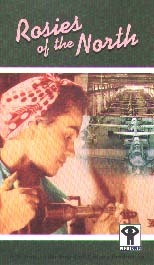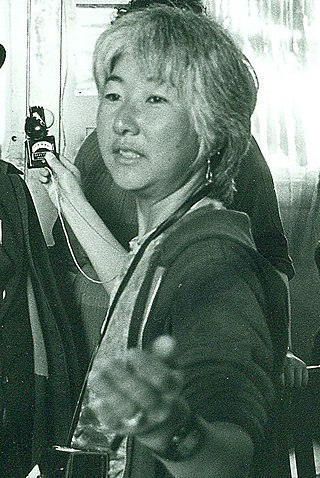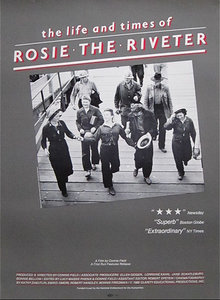
Sergeant York is a 1941 American biographical film about the life of Alvin C. York, one of the most decorated American soldiers of World War I. Directed by Howard Hawks and starring Gary Cooper in the title role, the film was a critical and commercial success, and became the highest-grossing film of 1941. In 2008, Sergeant York was selected for preservation in the United States National Film Registry by the Library of Congress as being "culturally, historically, or aesthetically significant".

The Atomic Cafe is a 1982 American documentary film directed by Kevin Rafferty, Jayne Loader and Pierce Rafferty. It is a compilation of clips from newsreels, military training films, and other footage produced in the United States early in the Cold War on the subject of nuclear warfare. Without any narration, the footage is edited and presented in a manner to demonstrate how misinformation and propaganda was used by the U.S. government and popular culture to ease fears about nuclear weapons among the American public.

Antonia: A Portrait of the Woman is a 1974 documentary about symphony conductor Antonia Brico, including her struggle against gender bias in her profession. The film was directed by Judy Collins and Jill Godmilow. It was nominated for an Academy Award for Best Documentary Feature.

Rosie the Riveter is an allegorical cultural icon in the United States who represents the women who worked in factories and shipyards during World War II, many of whom produced munitions and war supplies. These women sometimes took entirely new jobs replacing the male workers who joined the military. She is widely recognized in the "We Can Do It!" poster as a symbol of American feminism and women's economic advantage. Similar images of women war workers appeared in other countries such as Britain and Australia. The idea of Rosie the Riveter originated in a song written in 1942 by Redd Evans and John Jacob Loeb. Images of women workers were widespread in the media in formats such as government posters, and commercial advertising was heavily used by the government to encourage women to volunteer for wartime service in factories. Rosie the Riveter became the subject and title of a Hollywood film in 1944.

Nelson George is an American author, columnist, music and culture critic, journalist, and filmmaker. He has been nominated twice for the National Book Critics Circle Award.

Molly Clark Haskell is an American film critic and author. She contributed to The Village Voice—first as a theatre critic, then as a movie reviewer—and from there moved on to New York magazine and Vogue. Her most influential book is From Reverence to Rape: The Treatment of Women in the Movies. She co-hosted Turner Classic Movies' The Essentials with Robert Osborne in 2006 for one season.

Garlic Is as Good as Ten Mothers is a 1980 documentary film about garlic directed by Les Blank. Its official premiere was at the 1980 Berlin Film Festival.
Days of Waiting (1991) is a documentary short film directed, written and produced by Steven Okazaki about Estelle Ishigo, a Caucasian artist who went voluntarily to an internment camp for Japanese Americans during World War II. The film was inspired by Ishigo's book, Lone Heart Mountain, and won an Academy Award for Best Documentary and a Peabody Award. It was presented on PBS by POV and the Center for Asian American Media.

Daughter from Đà Nẵng is a 2002 documentary film about an Amerasian, Heidi Bub, meeting her biological family in Da Nang, decades after being brought to the United States in 1975 during Operation Babylift at the end of the Vietnam War.
Patricia Cardoso is a Colombian and American filmmaker. She is best known for her 2002 film Real Women Have Curves, which centers around the experiences of a young Mexican-American woman navigating the challenges of family, culture, and body image. The film's lasting impact was recognized in 2019, when it was selected by the Library of Congress for inclusion in the National Film Registry "as a cinematic treasure and worthy of preservation as part of America's patrimony". This honor made Cardoso the first Latinx woman director to have a film included in the registry.

Andrea Kalin is an American independent filmmaker, writer, producer, and director. She is also the principal and founder of Spark Media and founder and executive director of Stone Soup Productions, a 501(c)(3) non-profit foundation.
Isaac in America: A Journey With Isaac Bashevis Singer is a 1986 documentary made by director Amram Nowak and producer Kirk Simon. It was broadcast on the PBS series American Masters.

Rosie the Riveter is a 1944 American musical film directed by Joseph Santley and starring Jane Frazee, Frank Albertson and Barbara Jo Allen. It is inspired by the iconic character of the same name.
Mike Valerio is a writer, producer, director, and executive in the entertainment industry for over 20 years. Valerio has worked on over a hundred TV shows, films, documentaries, and mini-series and over a dozen television networks and entertainment companies. Valerio is most famous for his 1999 film Carlo's Wake.

A'Lelia Perry Bundles is an American journalist, news producer and author, known for her 2001 biography of her great-great-grandmother Madam C. J. Walker.
Marion "Muffie" Meyer is an American director, whose productions include documentaries, theatrical features, television series and children’s films. Films that she directed are the recipients of two Emmy Awards, CINE Golden Eagles, the Japan Prize, Christopher Awards, the Freddie Award, the Columbia-DuPont, and the Peabody Awards. Her work has been selected for festivals in Japan, Greece, London, Edinburgh, Cannes, Toronto, Chicago and New York, and she has been twice nominated by the Directors Guild of America.

Rosies of the North is a 46-minute Canadian documentary film made in 1999 by the National Film Board of Canada (NFB) and directed by Kelly Saxberg. The film recounts the story of the women at the Canadian Car and Foundry in Fort William, Ontario, who built fighter and bomber aircraft needed for the war effort in the Second World War. It also is the story of female engineer Elsie MacGill, who became known as the "Queen of the Hurricanes". The title of the film is an allusion to the wartime iconic image of Rosie the Riveter.
Connie Field is an American film director known for her work in documentaries.

Frances Mary Albrier was an American civil rights activist and community leader.

Emiko Omori is an American cinematographer and film director known for her documentary films. Her feature-length documentary Rabbit in the Moon won the Best Documentary Cinematography Award at the 1999 Sundance Film Festival and an Emmy Award after it was broadcast on PBS that same year. One of the first camerawomen to work in news documentaries, Omori began her career at KQED in San Francisco in 1968.














